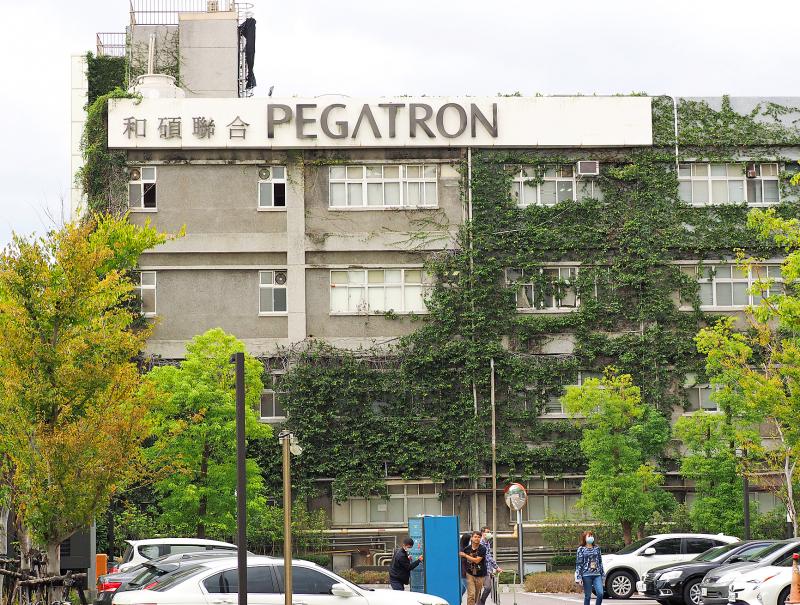Pegatron Corp (和碩), which assembles iPhones and notebook computers, yesterday slashed its forecast for notebook computer shipments to a quarterly decline of between 5 and 10 percent this quarter as China’s COVID-19 lockdowns suspended productions and upended supply chain logistics.
That compared with the company’s previous guidance of a quarterly increase of between 25 and 30 percent this quarter.
Shipments of desktop computers and motherboards would drop by between 30 and 35 percent this quarter from last quarter, Pegatron said.

Photo: David Chang, EPA-EFE
Non-notebook computer business is to see a quarterly decline as well, it said.
In the January-to-March quarter, Pegatron reported a 64.3 percent year-on-year decline in net profit to NT$1.67 billion (US$56 million), from NT$5.22 billion, hitting the lowest level in about 11 quarters.
NON-OPERATING LOSS
On a quarterly basis, net profit slumped 78.8 percent from NT$7.86 billion.
The weak performance was due to a non-operating loss of NT$449 million, mainly due to value impairment from its shareholding of China’s Luxshare Precision Industry Co (立訊精密). Pegatron holds about 0.57 percent of Luxshare.
Pegatron booked non-operating gains of NT$1.6 billion a year earlier and NT$3.59 billion in the previous quarter, company data showed.
Operating income surged 90.7 percent annually to NT$4.23 billion last quarter, but plunged 45.6 percent from NT$7.77 billion the previous quarter.
First-quarter revenue contracted 28 percent quarterly, but surged 49 percent annually to NT$324 billion last quarter, with communications products acounting for 60 percent of total sales, it said.
CAPACITY EXPANSION
To boost capacity, Pegatron’s board of directors yesterday approved an additional investment of US$50.61 million in its US manufacturing facilities.
That followed the board’s approval in November last year of a proposal to invest US$164 million to expand its US plant.
The board also approved additional investment of US$40 million in its US subsidiary, Pegatron Electronics Inc, the company said in a regulatory filing.

To many, Tatu City on the outskirts of Nairobi looks like a success. The first city entirely built by a private company to be operational in east Africa, with about 25,000 people living and working there, it accounts for about two-thirds of all foreign investment in Kenya. Its low-tax status has attracted more than 100 businesses including Heineken, coffee brand Dormans, and the biggest call-center and cold-chain transport firms in the region. However, to some local politicians, Tatu City has looked more like a target for extortion. A parade of governors have demanded land worth millions of dollars in exchange

An Indonesian animated movie is smashing regional box office records and could be set for wider success as it prepares to open beyond the Southeast Asian archipelago’s silver screens. Jumbo — a film based on the adventures of main character, Don, a large orphaned Indonesian boy facing bullying at school — last month became the highest-grossing Southeast Asian animated film, raking in more than US$8 million. Released at the end of March to coincide with the Eid holidays after the Islamic fasting month of Ramadan, the movie has hit 8 million ticket sales, the third-highest in Indonesian cinema history, Film

Taiwan Semiconductor Manufacturing Co’s (TSMC, 台積電) revenue jumped 48 percent last month, underscoring how electronics firms scrambled to acquire essential components before global tariffs took effect. The main chipmaker for Apple Inc and Nvidia Corp reported monthly sales of NT$349.6 billion (US$11.6 billion). That compares with the average analysts’ estimate for a 38 percent rise in second-quarter revenue. US President Donald Trump’s trade war is prompting economists to retool GDP forecasts worldwide, casting doubt over the outlook for everything from iPhone demand to computing and datacenter construction. However, TSMC — a barometer for global tech spending given its central role in the

Alchip Technologies Ltd (世芯), an application-specific integrated circuit (ASIC) designer specializing in server chips, expects revenue to decline this year due to sagging demand for 5-nanometer artificial intelligence (AI) chips from a North America-based major customer, a company executive said yesterday. That would be the first contraction in revenue for Alchip as it has been enjoying strong revenue growth over the past few years, benefiting from cloud-service providers’ moves to reduce dependence on Nvidia Corp’s expensive AI chips by building their own AI accelerator by outsourcing chip design. The 5-nanometer chip was supposed to be a new growth engine as the lifecycle